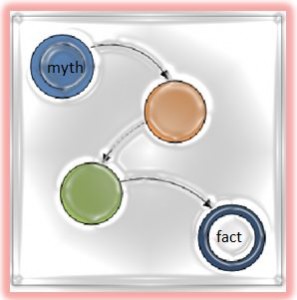 In the Next Brain Blog one of our goals is to help you apply the latest findings from neuroscience to improve or protect how well you think, learn, solve problems and make decisions on a daily basis. We want to use science to boost brain function and cognitive performance in very practical ways. One way to do that is to surface and debunk myths about the brain. So I am always on the lookout for scientific studies into myths about how our brains work.
In the Next Brain Blog one of our goals is to help you apply the latest findings from neuroscience to improve or protect how well you think, learn, solve problems and make decisions on a daily basis. We want to use science to boost brain function and cognitive performance in very practical ways. One way to do that is to surface and debunk myths about the brain. So I am always on the lookout for scientific studies into myths about how our brains work.
For example, a study published in Frontiers in Psychology examined how 242 teachers in Europe responded to common myths about how the brain works in education. The findings were striking. For example, 82% of the educators believe the myth of learning styles or:
“Individuals learn better when they receive information in their preferred learning style (e.g., auditory, visual, kinesthetic)”
This means even professional can fall victim to brain myths. Check out the myths below and see how they stack up to your beliefs. This is direct excerpt from the appendix of the paper:
- “Children must acquire their native language before a second language is learned. If they do not do so neither language will be fully acquired
- If pupils do not drink sufficient amounts of water (=6–8 glasses a day) their brains shrink
- It has been scientifically proven that fatty acid supplements (omega-3 and omega-6) have a positive effect on academic achievement
- We only use 10% of our brain
- Differences in hemispheric dominance (left brain, right brain) can help explain individual differences amongst learners
- The brains of boys and girls develop at the same rate
- Brain development has finished by the time children reach secondary school
- There are critical periods in childhood after which certain things can no longer be learned
- Individuals learn better when they receive information in their preferred learning style (e.g., auditory, visual, kinesthetic)
- Mental capacity is hereditary and cannot be changed by the environment or experience
- Environments that are rich in stimulus improve the brains of pre-school children
- Children are less attentive after consuming sugary drinks and/or snacks
- Exercises that rehearse co-ordination of motor-perception skills can improve literacy skills
- Learning problems associated with developmental differences in brain function cannot be remediated by education
- Short bouts of co-ordination exercises can improve integration of left and right hemispheric brain function
- When we sleep, the brain shuts down.”
Interested to hear from readers that have discovered and debunked brain myths. How did going from myth to fact help you improve your cognitive performance?
 You will often hear that staying “mentally active” is important for maintaining a brain health as you age. A variation on the use it or lose it theme. But what exactly does being mentally active mean in this sense? Is reading a book OK and watching an action movie not?
You will often hear that staying “mentally active” is important for maintaining a brain health as you age. A variation on the use it or lose it theme. But what exactly does being mentally active mean in this sense? Is reading a book OK and watching an action movie not?
A new study tackles this question and the findings are interesting. Turns out activities such as – playing a game, listening to classical music or solving cross word puzzles – “probably won’t bring noticeable benefits to an aging mind”. That is an interesting claim as these types are activities are frequently sited as good examples of what should provide benefit.
The key is to engage in mental activities outside your comfort zone that force you to learn new skills. For example, learning photography or quilting. The general point is:
“It seems it is not enough just to get out and do something — it is important to get out and do something that is unfamiliar and mentally challenging, and that provides broad stimulation mentally and socially,…”
Doing mental activities that we have already mastered, while still worthwhile, may not be providing the brain boost and protection we need as we age.
 In the Next Brain blog we report on foods that offer some scientific promise of either protecting your brain health or improving cognitive performance. A list of 10 Top Foods to Boost Brainpower published by Forbes Magazine caught my eye. While it includes items typically found on such lists – for example blueberries, curry and walnuts – it also includes many I don’t normally see such as chickpeas, celery and crab.
In the Next Brain blog we report on foods that offer some scientific promise of either protecting your brain health or improving cognitive performance. A list of 10 Top Foods to Boost Brainpower published by Forbes Magazine caught my eye. While it includes items typically found on such lists – for example blueberries, curry and walnuts – it also includes many I don’t normally see such as chickpeas, celery and crab.
The claim about crab is particularly interesting. A serving exceeds your daily requirement of phenylalanine, an amino acid that is needed to create dopamine. I am going to do a little research into that and will blog my findings.
Source of image: openclipart.org
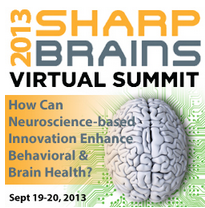 Sharp Brains organized an on-line summit focused on understanding how neuroscience-based innovation can enhance behavioral and brain health. The event included some 30 speakers covering industry and academia. The organizers summarized the top 30 highlights some of which are relevant for readers of the Next Brain Blog. For example:
Sharp Brains organized an on-line summit focused on understanding how neuroscience-based innovation can enhance behavioral and brain health. The event included some 30 speakers covering industry and academia. The organizers summarized the top 30 highlights some of which are relevant for readers of the Next Brain Blog. For example:
“The breakdown of how much time/effort is required to practice different types of meditation/relaxation exercises, and why Kirtan Kriya meditation may be more efficient and scalable than other forms of meditation as a public brain health measure for Alzheimer’s Disease prevention. (Dharma Singh Khalsa)”
You can access recordings to all the talks for $175. I am going to buy and review them later this month.
In the Next Brain blog we report on research that suggests how we think about our own mental abilities has a significant impact on how well we perform. For example, in Perception of Age Impacts Cognitive Performance, we reported on a study that shows simply “thinking that you are old” will impact your score on a dementia test.
 Self-image, especially as it relates to what we believe we know, might be a powerful placebo for cognitive performance. More evidence comes from Your Thinking can Release Abilities Beyond Normal Limits, in The Scientific American. The article reviews an experiment that shows if you expect to know the answer to a question you tend to score better.
Self-image, especially as it relates to what we believe we know, might be a powerful placebo for cognitive performance. More evidence comes from Your Thinking can Release Abilities Beyond Normal Limits, in The Scientific American. The article reviews an experiment that shows if you expect to know the answer to a question you tend to score better.
Such results suggest (but by no means prove) that confidence, positive thinking, a growth mindset and affirmation could have a significant impact on memory, learning, creativity, visual acuity and a wide-range of cognitive performances.
This is a good news. It does not take too much effort to develop a positive affirmation about our mental abilities and then repeat it on a regular basis. For example, when struggling with a hard problem you could regularly repeat: “As I have in the past, I will see the answer to this problem”. You could even combine the affirmation with a ritual such as sitting in your creative chair or wearing your lucky shirt.
I am interested to hear from readers that have examples of placebos for cognitive performance.
Mind Tools has developed a 16-question creativity test you can complete in about 3 minutes. Not only does it give you an overall creativity score and rank, but you get a question by question analysis and suggestions for how to improve.
I have built some of the best techniques for improving creativity into NewHabits, a free iPhone and iPad app. Once you download the app, tap the store tab and check out Reframe, a deck of knowledge cards designed to help you master advanced creativity techniques.
There are a total of 25 cards. Play a card daily from your mobile device to experiment with and eventually master a proven creativity technique. Cards are designed to fit into everyday routines and take minutes to use. The Reframe cards work by converting general advice and complex how-to knowledge about creativity into right-sized chunks that are optimized for how we learn from experience.
A list of the Refram cards and an example are shown below.
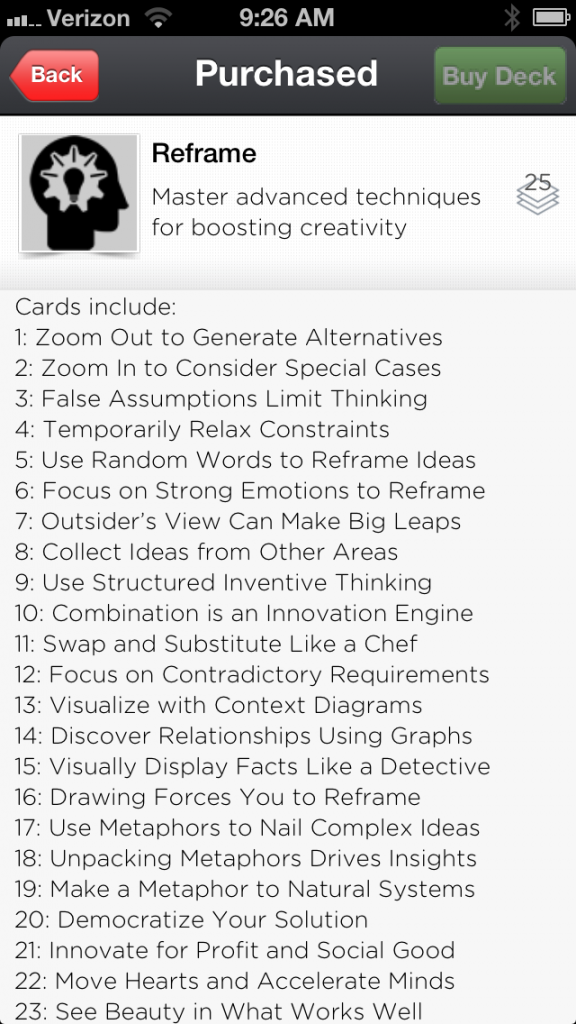
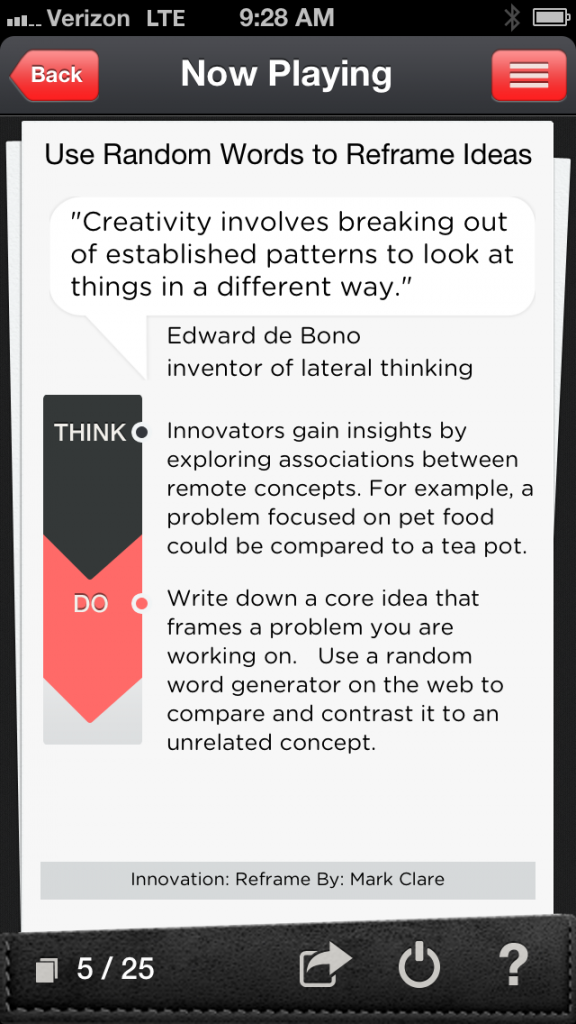
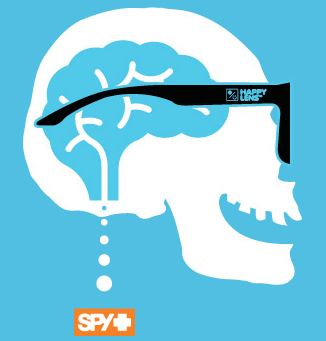 SPY has modified premium quality sunglasses to allow long-wave blue light to pass into your eyes in the hopes of creating a positive mood. The SPY Happy Lens Technology is designed to:
SPY has modified premium quality sunglasses to allow long-wave blue light to pass into your eyes in the hopes of creating a positive mood. The SPY Happy Lens Technology is designed to:
“harmonize” with the body’s physiological preference for a specific color transmission, optimized through the important wavelengths between 450 and 500 nanometers, where the “uplifting” effects of blue (“happy”) light are most prevalent.”
While there is some evidence that this can work the product is new to the market. Cost is in the $150-$200 range and glasses are available in a variety of styles and come with a guarantee.
Click on the image to watch a video on how they work.
Interested to hear from readers that wear happy glasses.
Categories:
Mental Focus Tags:
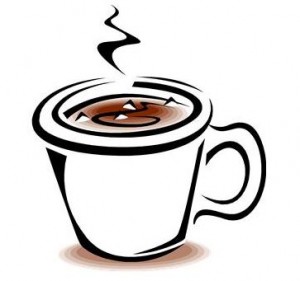 A recent study demonstrated that two cups of hot cocoa a day for a month improved brain health and thinking skills in the elderly. The study included 60 people who on average were in there 70s. Those participants with impaired blood flow showed an 8.3% percent improvement in blood flow and a 31% improvement in response time on a working memory test.
A recent study demonstrated that two cups of hot cocoa a day for a month improved brain health and thinking skills in the elderly. The study included 60 people who on average were in there 70s. Those participants with impaired blood flow showed an 8.3% percent improvement in blood flow and a 31% improvement in response time on a working memory test.
In more technical terms:
There is a strong correlation between neurovascular coupling and cognitive function, and both can be improved by regular cocoa consumption in individuals with baseline impairments. Better neurovascular coupling is also associated with greater white matter structural integrity.
Neurovascular coupling refers to the link between brain activity and the amount of cerebral blood flow. Better blood flow, better thinking. This is a new finding.
Participants consumed no other chocolate during the test.
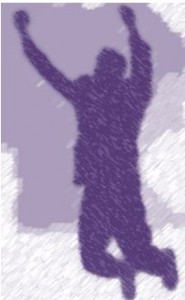 Cognition is embodied. That is, how well you think and learn is in part controlled by how you use your body. We have covered many examples of how this works in the Next Brain Blog including stepping back for better emotional control, talking with your hands, thinking by walking around, posture effects (e.g. folding your arms) and short-duration physical activities interspersed with study.
Cognition is embodied. That is, how well you think and learn is in part controlled by how you use your body. We have covered many examples of how this works in the Next Brain Blog including stepping back for better emotional control, talking with your hands, thinking by walking around, posture effects (e.g. folding your arms) and short-duration physical activities interspersed with study.
See Use Your Body to Improve Thinking Instantly for more details.
Now the PsyBlog offers an excellent summary in 8 Easy Bodily Actions that Transform Mental Performance. These include for example, how using a deep voice can improve abstract thinking, a power stance can improve your sense of control, and just imaging yourself walking towards an important person or object can increase a sense of mastery.
Some of these are new to me and I am actively experimenting with them. Interested to hear from readers that have tried them out.
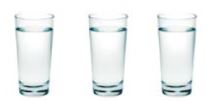 Being thirsty might be distracting enough to significantly interfere with your results on a simple response time test. At least that is what recent research reported in the Frontiers in Human Neuroscience suggests.
Being thirsty might be distracting enough to significantly interfere with your results on a simple response time test. At least that is what recent research reported in the Frontiers in Human Neuroscience suggests.
The Live Science blog summarizes the experiment nicely in the post, Drinking Water May Provide a Mental Boost. The bottom line:
“In the study, participants who drank about three cups of water (24 ounces, or 775 milliliters) before taking a battery of cognitive tests performed better on a test that measured reaction times compared with those who did not drink water…Reaction times were 14 percent faster among the water group than the no water group.”
For this effect to work participants needed to feel thirsty and were asked to avoid eating and drinking over the night before the experiment.
The article goes on to report that the link between slaking your thirst and cognitive performance is far from clear.
 In the Next Brain Blog one of our goals is to help you apply the latest findings from neuroscience to improve or protect how well you think, learn, solve problems and make decisions on a daily basis. We want to use science to boost brain function and cognitive performance in very practical ways. One way to do that is to surface and debunk myths about the brain. So I am always on the lookout for scientific studies into myths about how our brains work.
In the Next Brain Blog one of our goals is to help you apply the latest findings from neuroscience to improve or protect how well you think, learn, solve problems and make decisions on a daily basis. We want to use science to boost brain function and cognitive performance in very practical ways. One way to do that is to surface and debunk myths about the brain. So I am always on the lookout for scientific studies into myths about how our brains work.









